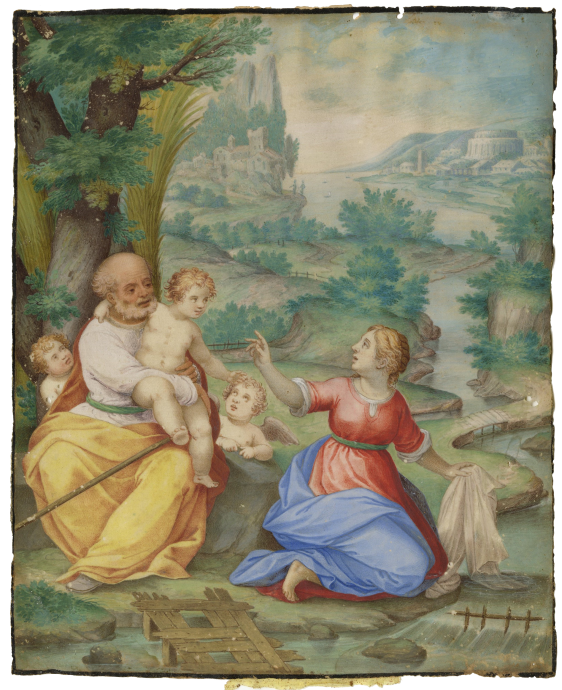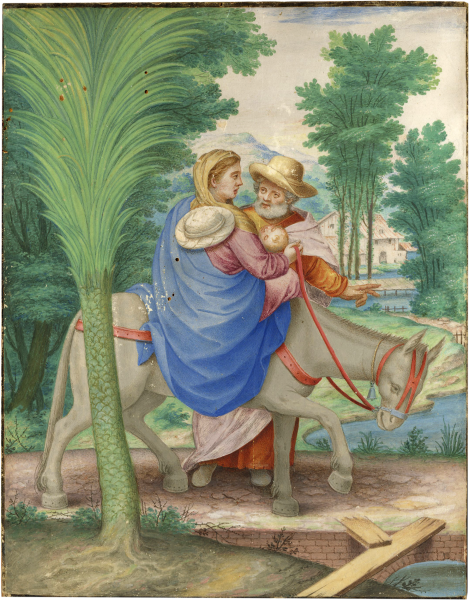


Giovanni Battista Castello “Il Genovese”
, Italy, Genoa, c. 1605Giovanni Battista Castello “Il Genovese”
Description
This luminous miniature of the Holy Family by Giovanni Battista Castello “Il Genovese” (1547-1637) dates to the early seventeenth century when the artist was at the height of his career. The miniature was mostly likely part of a series of paintings depicting the life of the Virgin. A second miniature, The Flight to Egypt (Les Enluminures MIN 50384), is also known from this series (fig. 1). The lively pose of the Virgin, who twists to face Joseph, as well as that of the Christ Child, squirming in Joseph’s lap, reveal the influence of Italian Mannerists such as the Genoese painter Luca Cambiaso (c.1509-c.1569) with whom Castello studied. The miniature also showcases Castello’s skill with landscapes, inspired by Dutch realism, with a deep recess of space carefully modeled through atmospheric perspective.
Born in Genoa, Castello is often called “Il Genovese” to distinguish him from an unrelated contemporary of the same name. While trained as a goldsmith, Castello specialized in devotional miniatures on vellum, a genre he revived and expanded from models found in late Medieval and early Renaissance illuminated manuscripts. His works were especially prized in Counter-Reformation Europe and collected by Catholic monarchs and aristocrats who frequently installed them as adornments for their personal chapels or cabinets of curiosities (fig. 2). His reputation spread as far as Spain, where he was hired by Emperor Philip II to illuminate the royal choir books in the Escorial in 1584 (Biblioteca del Monasterio de San Lorenzo, MSs. L.F. 14-16). He returned to Genoa around 1590 and was commissioned in 1599 by Margaret of Austria, queen-consort of Philip III, to copy an icon in the church of San Bartolomeo degli Armeni. The last years of the sixteenth and the first two decades of the seventeenth century saw Castello at the peak of his activity, producing small, highly refined religious subjects. These works were especially praised for their “colors of exquisite delicacy” by Raffaello Soprani who included a laudatory biography of Castello in his 1674 publication on Genoese artists (Soprani 1674, 135-138).
Castello’s oeuvre is extensive due to the exceptional length of his career (he died at age ninety) as well as the artist’s propensity to conserve “every little work, even if it was a simple sketch” (Soprani 1674, pp. 136). A comprehensive catalogue of his paintings is lacking as most remain in private collections. Chronologies are also difficult to establish since few of his works are signed or dated. While this miniature is undated, its style and soft color palette match numerous works painted by Castello in the first two decades of the seventeenth century (fig. 3). Although once considered a mere imitator of sixteenth-century masters, Castello is now rightly recognized as a major artist of his era who contributed important devotional paintings during the period of the Counter Reformation. A major exhibition of the artist’s work was held in Genoa in 1990 and, more recently, a new study by Elena De Laurentiis has substantially updated the artist’s oeuvre, identify more than 170 works in both public and private collections.
We are grateful to Elena De Laurentiis for her expertise.
Literature
Unpublished. On Giovanni Battista Castello “il Genovese” see:
De Laurentiis, E. Giovanni Battista Castello detto il Genovese (1549-1639), Genoa, Forthcoming.
De Laurentiis Accornero, E. “Il pio genovese Giovanni Battista Castello,” Alumina: Pagine Miniate 37 (2012), pp. 26-35.
De Laurentiis Accornero, E. “Giovanni Battista Castello ‘il Genovese,’” in Maestros del Barroco europeo: Catalogo della Galleria Jorge Coll e Nicolás Cortés, Madrid, 2005, pp. 88-91.
De Laurentiis Accornero, E. “Giovanni Battista Castello ‘il Genovese,’ Giulio Clovio, e lo scriptorium dell’Escorial,” in Genova e la Spagna: Opere, artisti, committenti, collezionisti, eds. Airaldi, Gabriella et al., Milan, 2002, pp. 157-165.
Di Fabio, C., ed., Giovanni Battista Castello “Il Genovese”: Miniatura e devozione a Genova fra Cinque e Seicento, Genoa, 1990.
Soprani, R. Le vite de pittori, scoltori et architetti genovesi…, Genoa, 1674, pp. 135-138.
